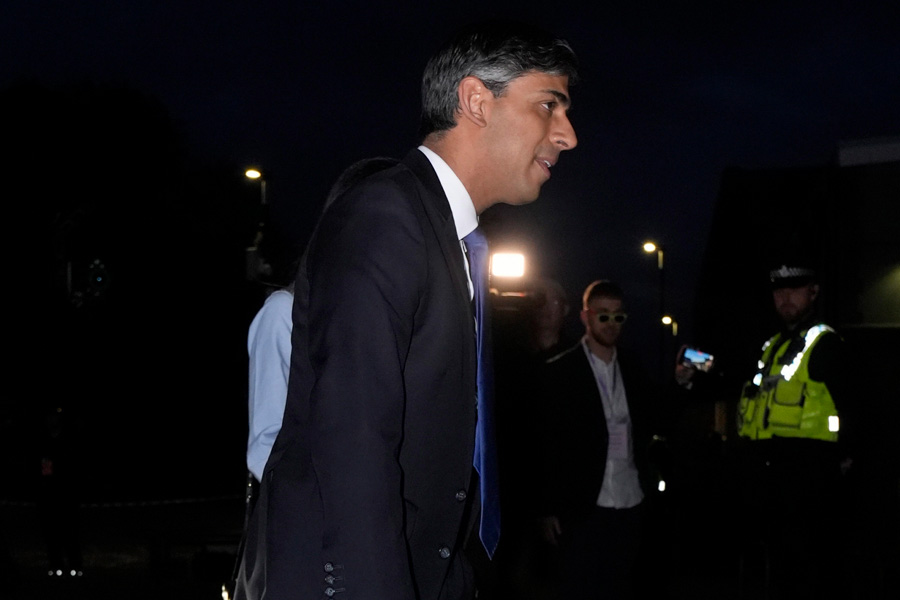The recriminations and jostling for top positions among Britain’s Conservative lawmakers began long before Thursday’s crushing election defeat to Labour that some party figures said left the party facing the prospect of a decade out of power.
After 14 years in government — the last eight marked by chaos and divisions following the Brexit vote — the Conservatives are now confronted by an internal struggle among lawmakers, grassroots members and donors over whether to move further to the right or turn back to the centre.
Keir Starmer’s Labour Party won Thursday’s election by a landslide, achieving a massive majority in parliament, while the Conservatives suffered the worst performance in the party’s long history, due to anger over a drop in living standards and the resurgence of the Right-wing Reform UK party.
Reuters spoke to 20 politicians, party members and strategists who said the expected resignation of Prime Minister Rishi Sunak as Conservative leader would trigger a battle among the institutions that underpin the party — with the Right-wing media, financial backers, think tanks and vocal members all wanting a say.
The outcome will help determine whether a party that has governed Britain alone or in coalition for around 100 years since it was formed in 1834 can rebuild from a much-diminished state.
One veteran Conservative former lawmaker predicted a “bloodbath” as the party sought a new direction and set about charting its way back to power.
“The party will suffer a kind of nervous breakdown, which will continue for a wee while,” said the former lawmaker, who declined to be identified. “And it’s then going to be necessary to find a way forward.”
Several lawmakers are expected to compete to replace Sunak, the party sources said, with the Right wing likely to promote two former interior ministers known for a tough line on immigration — Priti Patel and Suella Braverman — as well as former trade minister Kemi Badenoch, named minister of the year by the website ConservativeHome in 2023 after she took a robust position on trans issues.
Braverman was quick to promise change to voters. “I’m sorry that my party didn’t listen to you,” she said in a speech after winning re-election. “I will do everything in my power to rebuild trust. We need to listen to you, you have spoken to us very clearly.”
The party sources said centrist candidates were also preparing campaigns, with James Cleverly and Tom Tugendhat, interior and security ministers under Sunak respectively, named as possible contenders.
Indicating the likely arguments ahead, three Conservatives questioned the Right-wing credentials of Robert Jenrick, a former immigration minister who has been working hard to shore up his support, after he previously adopted more centrist positions.
Penny Mordaunt, a centrist who was Sunak’s Leader of the House of Commons, had also been consulting colleagues on her chances, but lost her seat to Labour. Accepting defeat, she warned Conservatives against talking to “an ever smaller slice of ourselves” as they sought to renew the party.
Veteran party adviser Peter Botting described the battle for the leadership as being between those who became Conservative because of former Prime Minister Margaret Thatcher — a staunch free-marketeer — and those who followed the moderniser David Cameron, with his more paternalistic “one nation conservativism”.
“People will want big personalities: big, easily identifiable personalities,” Botting said. “There are a lot of eminently forgettable people but they all think that they can be a Prime Minister.”
Reform UK threat
The former lawmaker said the Conservative Party should move to the Right, to meet the challenge posed by Brexit campaigner Nigel Farage’s Reform UK party. Farage won a seat in parliament at the eighth time of trying.
While Labour’s roughly 34 per cent share of the vote was far lower than its showing at its 1997 landslide victory, the resurgence of Reform UK split the Right-wing vote and handed Starmer a massive majority under Britain’s first-past-the-post system.
Tim Bale, professor of politics at Queen Mary University, warned that a move to the Right would go against “the case that elections are won in the centre of British politics”.
“What we’ve seen since Brexit is the silent majority of more centrist MPs allow the party to slip towards the Right, due to a much more vocal minority of more populist politicians on that side of the Conservative Party,” he told Reuters.
By 0800 GMT and with 645 seats counted, Labour had 411 of the 650 seats in Parliament, compared with 119 for the Conservatives, according to BBC.
Reform only won four seats so far, but it picked up more than 4 million votes. The performance of Reform UK scared many Conservatives, with leader Farage promising to hound the Conservative Party and become the main voice of opposition.











